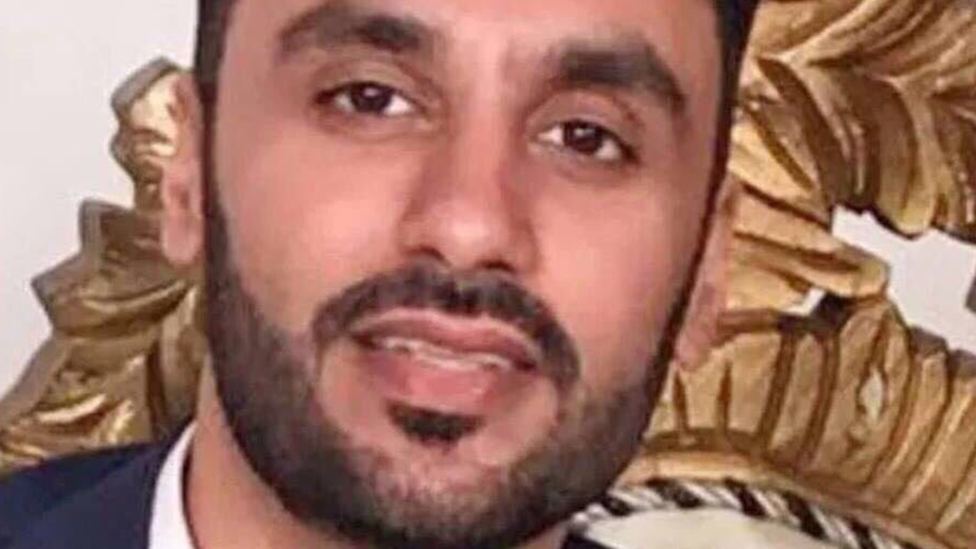Jagtar Singh Johal: British man 'tortured to sign blank confession' in India
- Published
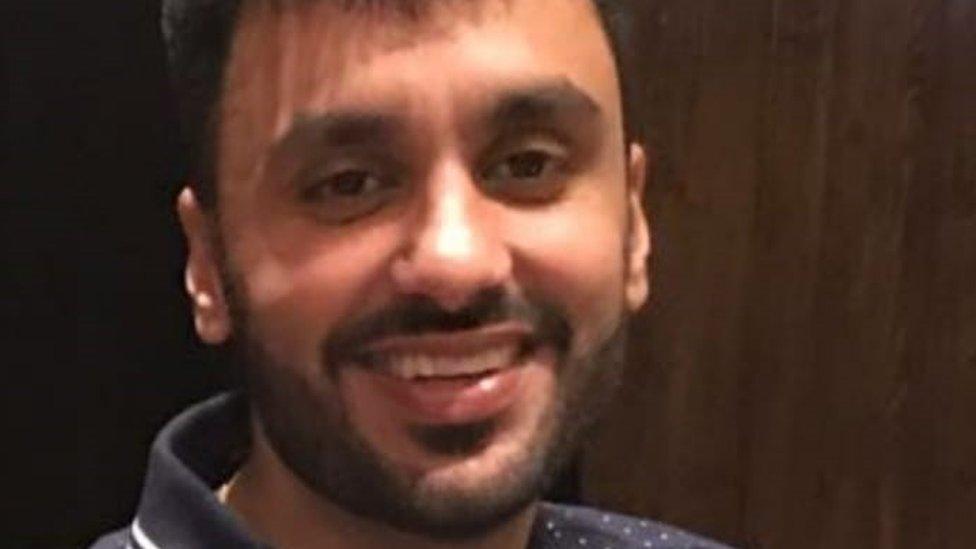
Jagtar Singh Johal, from Dumbarton, is being held under India's anti-terror law
A Scottish man who has been held in an Indian jail without conviction for three years has told the BBC he was tortured to sign a blank confession.
Jagtar Singh Johal, from Dumbarton, is being held under India's anti-terror laws, accused of conspiring to murder a number of right-wing Hindu leaders.
Court documents allege he helped fund the crimes and claim he was a member of a "terrorist gang".
Mr Johal told the BBC via his lawyer he had been "falsely implicated".
In answers to BBC questions obtained by his lawyer during a virtual prison meeting, the 33-year-old says he was physically tortured into signing a blank confession and forced to record a video which was broadcast on Indian TV.
"They made me sign blank pieces of paper and asked me to say certain lines in front of a camera under fear of extreme torture," he said via his lawyer.
Mr Johal's legal team also shared a copy of what they say is a handwritten letter from shortly after his arrest in November 2017 in which he details allegations of how the torture took place.
"Multiple shocks were administered by placing (the) crocodile clips on my earlobes, nipples and private parts," the letter says. "Multiple shocks were given each day.
"Two people would stretch my legs, another person would slap and strike me from behind, and the shocks were given by the seated officers."
"At some stages I was left unable to walk and had to be carried out of the interrogation room."
The BBC has been unable to independently verify these allegations of torture.
The Indian authorities strongly deny them, and have said "there is no evidence of mistreatment or torture as alleged".
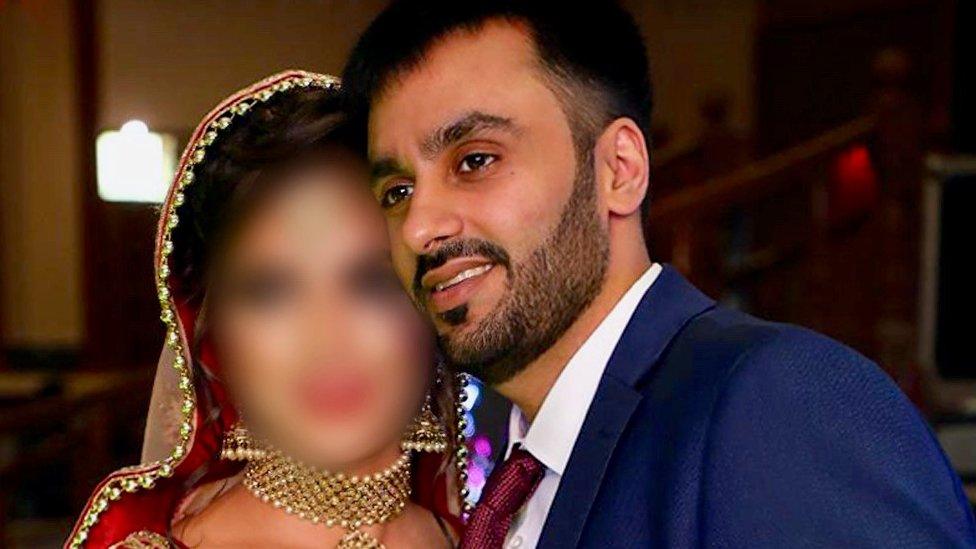
Jagtar got married in India in 2017
Mr Johal travelled to India in October 2017 for his wedding.
Videos of the occasion show the new groom jumping enthusiastically to Bhangra music as he celebrated.
In another he is seen holding his wife's hand, as they perform their first dance in front of friends and family.
"It was a cheerful day for us, it went exactly as planned," recalls his brother Gurpreet Singh Johal.
But a fortnight later, while on a shopping trip with his new bride in the North Indian state of Punjab, Mr Johal was taken away by police and has been in detention ever since.
'Violations against Sikhs'
His brother Gurpreet, who lives in Scotland, says Mr Johal was a peaceful activist and is convinced he was arrested because he had written about historical human rights violations against Sikhs in India.
"I believe my brother is being targeted because he was outspoken," Gurpreet says. "I believe he is innocent and will be proved innocent once the trial starts.
"Otherwise Indian officials should release him and return him back to his country."
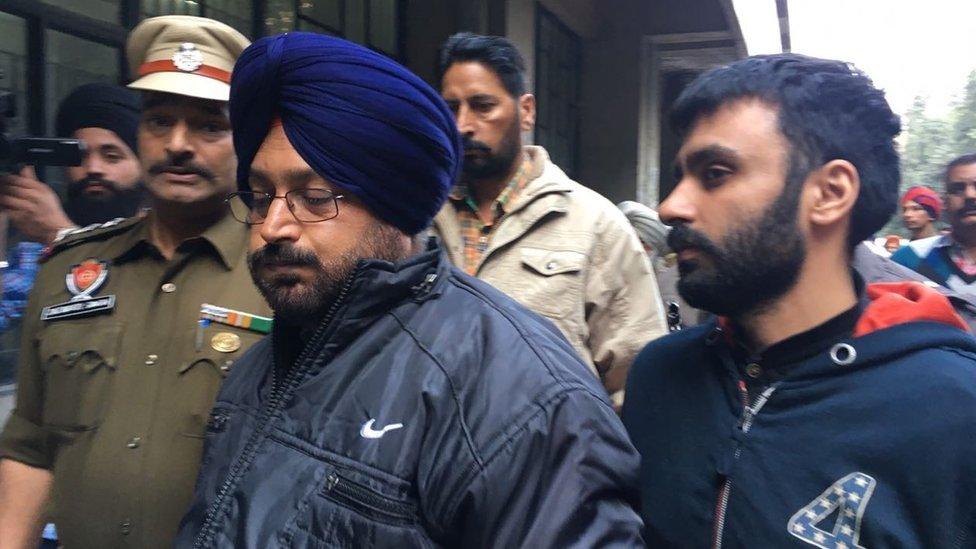
Jagtar Singh Johal (right) arrives at court in India in November 2017
Charge-sheets from the Indian authorities outline the case against Mr Johal and a group of men whom they believe were involved in a "series of killings" of right wing Hindu leaders.
It is claimed Mr Johal was a member of Khalistan Liberation Front (KLF), described in the documents as an international "terrorist gang".
He is accused of paying £3,000 to the former head of the KLF to help fund the crimes. The documents claim he "actively participated and had complete knowledge of the conspiracy".
"There are very serious charges against him including murder and abetment of terrorism," an Indian government official told the BBC.
"The seriousness of charges against him have been shared with the British authorities," they added.
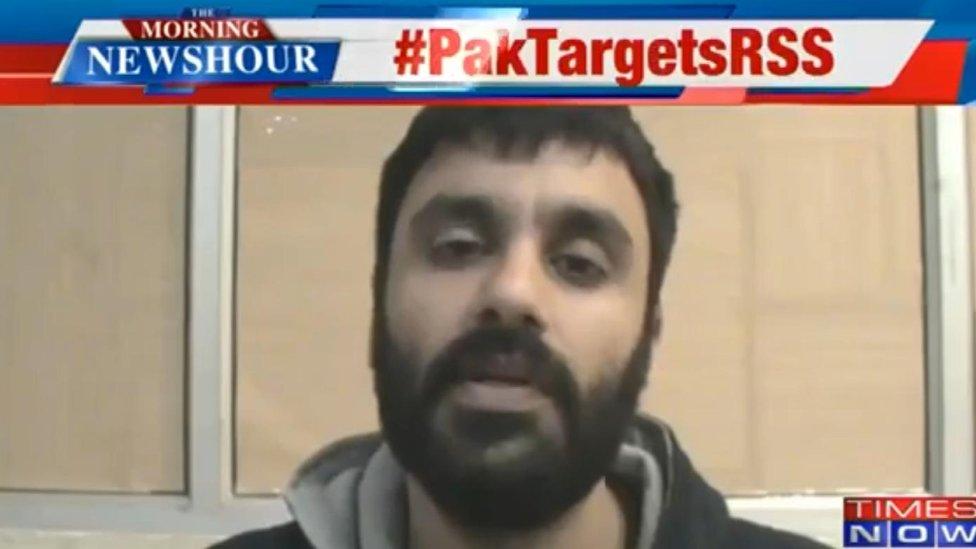
Footage which claims to show Mr Johal in custody was broadcast on Indian TV
Mr Johal's lawyer, Jaspal Singh Manjphur, who has represented him since he was first arrested, told the BBC he was concerned by the length of time it was taking for the case to go through the Indian legal system.
"He has been in custody for over three years," Mr Manjphur said. "Normally, if the prosecution wants, they can complete the case in that much time."
Mr Manjphur said the authorities had yet to provide any him with any evidence linking his client to the crimes and feared he was being framed, a charge denied by officials.
A few weeks ago, Mr Johal was accused of being involved in another crime. While in prison he has been arrested for helping to plot the murder of a man in October 2020.
"He is in a high security jail, he is under CCTV surveillance for 24 hours. How can he be in contact with anyone?", Mr Manjphur said.

Mr Johal was last seen in public at court in Delhi earlier this month
Mr Johal is being held at Delhi's maximum security Tihar jail.
He claims he is often forced to stay in solitary confinement and is denied the same facilities as other prisoners, such as hot water.
"By making me stay in these conditions, they are ensuring that my mental condition remains disturbed," he said.
"It is very tough to live here," he said.
The vast majority of inmates at the prison are, like Mr Johal, held before a conviction in what is known as an "under-trial" in India.
At the end of 2019, 82% of prisoners held in Tihar jail had yet to complete the trial process.
In India it can take many years before under-trial prisoners ever get to court, especially in terror cases where bail is hard to secure, a concern for Mr Johal's lawyer.
"He will languish in jail until the trial is completed, in such cases it could take anywhere between five to 10 years," Mr Manjphur said.

UK Foreign Secretary Dominic Raab has raised the case with his Indian counterpart
The human rights charity Reprieve has written to the UK Foreign Secretary Dominic Raab, asking that he calls for Mr Johal's immediate release.
Reprieve is also worried that some of the charges Mr Johal is awaiting trial for carry the death penalty as the maximum punishment. But experts stress that executions in India are extremely rare.
The UK's Foreign Commonwealth and Development office told the BBC that Mr Raab did raise the case with his Indian counterpart during his trip to India in December.
"We have consistently raised concerns about his case with the Government of India, including allegations of torture and mistreatment and his right to a fair trial," it said in a statement.
"Our staff continue to support Jagtar Singh Johal following his detention in India, and are in regular contact with his family and prison officials about his health and wellbeing."
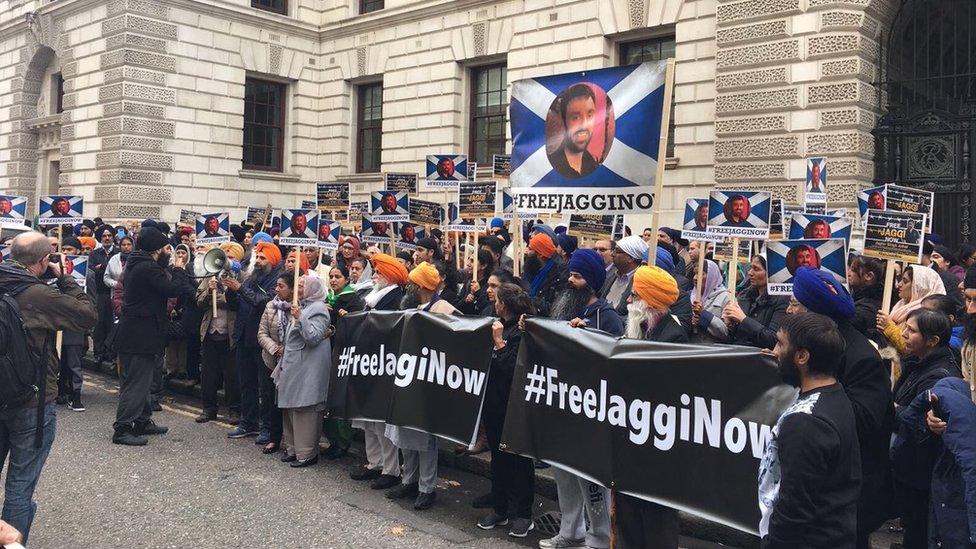
Hundreds of people protested outside the Foreign Office
But Mr Johal's brother Gurpreet said the family was still waiting for a meeting with the foreign secretary.
He said: "We are calling for either Jagtar to be charged and a fair trial to take place or to be returned back to his country so he can spend his life with his wife in the UK."
In August last year Gurpreet Singh Johal was joined by dozens who protested outside Downing Street.
Jagtar Singh Johal's case has sparked protests around the world, from Westminster to Washington, Geneva to Toronto.
In his statement to the BBC, Mr Johal had this message for officials back home: "I plead to the UK government to support me, I'm a British citizen and the government should understand that."
Related topics
- Published18 April 2018
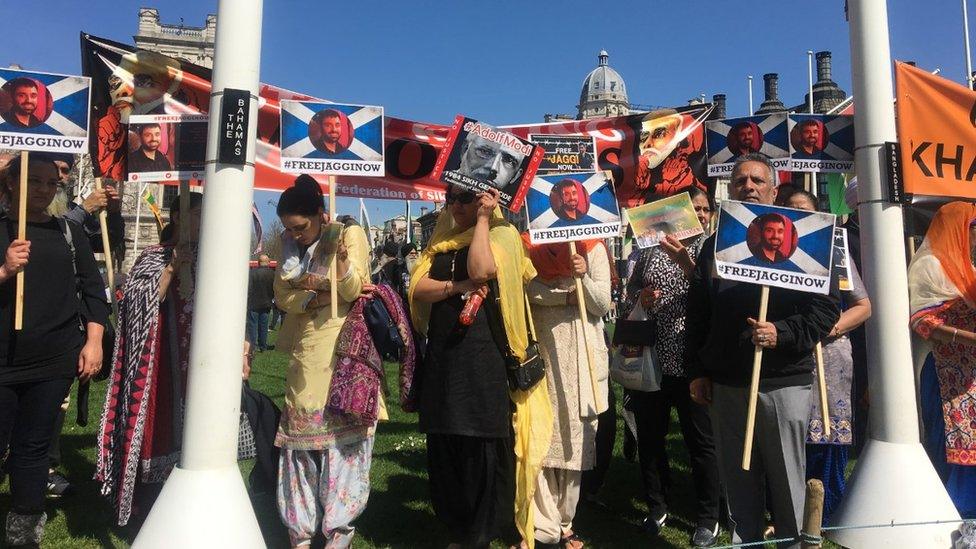
- Published4 May 2018
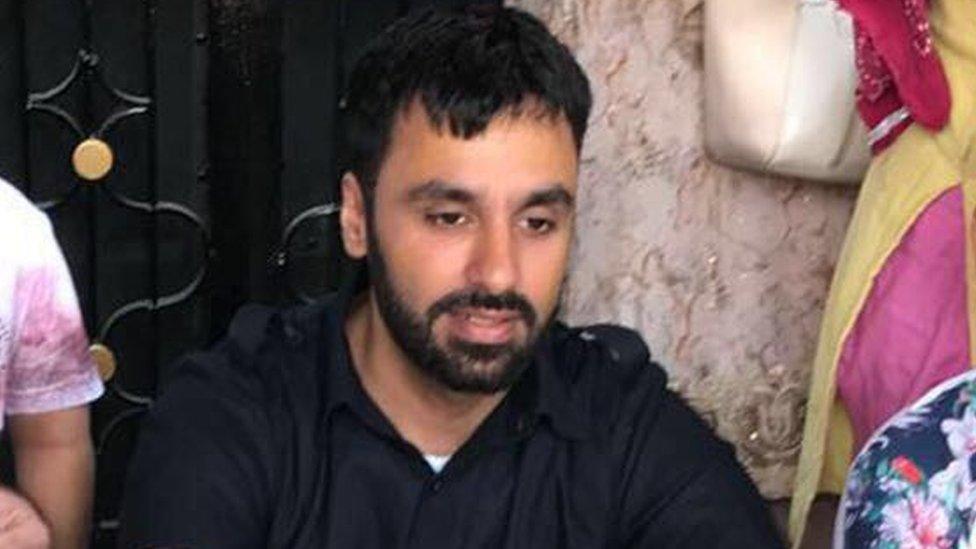
- Published21 November 2017
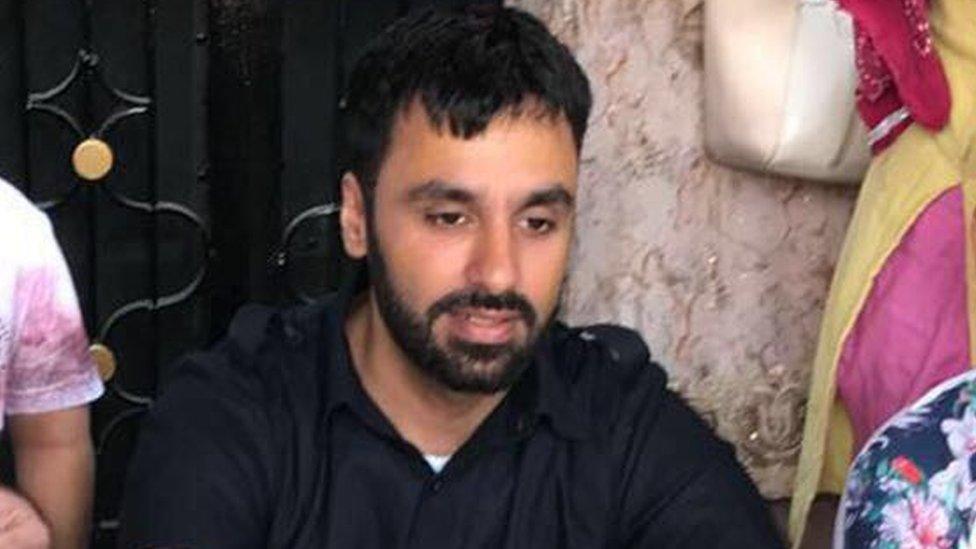
- Published10 November 2017
